|
|
|
Sort Order |
|
|
|
Items / Page
|
|
|
|
|
|
|
| Srl | Item |
| 1 |
ID:
151690
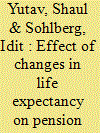

|
|
|
|
|
| Summary/Abstract |
Conditional life expectancy of the elderly has increased in developed countries, including Israel, in the last few decades. For Israel, this development and government policies adopted in the last decades have undermined the public’s pension security. The most significant factor that currently affects the pension level is the low number of accrual years in pension savings, particularly for women, but also for men. The rise in conditional life expectancy makes it necessary to extend people’s working years by developing a labour market suited to the needs of the elderly population. Age-related affirmative action in occupations best suited to the elderly should be instituted through relevant legislation.
|
|
|
|
|
|
|
|
|
|
|
|
|
|
|
|
| 2 |
ID:
165093


|
|
|
|
|
| Summary/Abstract |
Why did the United States fail to stop Israeli acquisition of nuclear weapons? Existing research argues that patrons such as the U.S. should have an easy time halting proliferation by militarily and economically vulnerable clients. Nevertheless, Israel acquired nuclear weapons with relatively little American opposition. Utilizing extensive primary source research, we argue that problematic intelligence-policy relations hindered U.S. efforts to arrest Israeli proliferation as (1) policymakers often gave mixed guidance to the intelligence community, resulting in (2) limited information on Israeli efforts that reinforced policy ambiguity. The results carry implications for understanding the dynamics of nuclear proliferation and intelligence-policy relations.
|
|
|
|
|
|
|
|
|
|
|
|
|
|
|
|
| 3 |
ID:
146789


|
|
|
|
|
| Summary/Abstract |
After the 1948 war, the cease-fire lines between Israel and its neighbours remained porous. Palestinian refugees crossed the borders. Some returned to cultivate their fields; others crossed the border as thieves. Some intended to murder Israelis and wreak terror. Most of the refugees who made their way into Israel were not violent, but their presence frightened Jewish civilians living in frontier regions. Policy-makers and cultural agents of the social elite mobilized to mould the threatened population into Israelis who could display fortitude. The article analyzes the emotional regime the Israeli state sought to inculcate and the desirable and undesirable outcomes of this policy.
|
|
|
|
|
|
|
|
|
|
|
|
|
|
|
|
| 4 |
ID:
164327


|
|
|
|
|
| Summary/Abstract |
This article discusses the shift in Israel’s policy towards its Arab minority in 1990–2010 – from a security-based to a civil approach. This shift was reflected not only in increased resource allocation but also in the initiation of a dialogue with Arab politicians and public figures. Among the most prominent results of this policy change have been a reduction in socioeconomic gaps between Israel’s Jewish and Arab communities, a growing number of Arabs enlisting in national service, greater integration of Arabs in the civil service, and the approval of master plans for the development of all Arab settlements.
|
|
|
|
|
|
|
|
|
|
|
|
|
|
|
|
| 5 |
ID:
165295
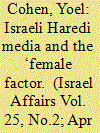

|
|
|
|
|
| Summary/Abstract |
In 2018 the Jerusalem District Court fined the Haredi Kol Barama radio station 1 million shekels ($280,000) for excluding women from the airwaves, stirring outrage within the Haredi community, highly sensitive to appearances of women in public contexts, which had created the station to provide radio broadcasts for its constituents, whose needs were not met by mainstream radio stations. The affair thus serves as a cardinal test of the level of freedom of a radio station, the interests of minority religious audiences, and the powers and responsibilities of the supervising public broadcasting authority.
|
|
|
|
|
|
|
|
|
|
|
|
|
|
|
|
| 6 |
ID:
146308


|
|
|
|
|
| Summary/Abstract |
SET UP IN 1948, Israel a year later was officially recognized by Turkey that became its closest partner in the Middle East, the region swept by the Arab wars of independence in which Turkey was the only pro-Western state. In 1954, Gamal Abdel Nasser explained that "Turkey, because of its Israeli policy, is disliked in the Arab world." At that time, their ties were mostly symbolic.1
|
|
|
|
|
|
|
|
|
|
|
|
|
|
|
|
| 7 |
ID:
158165
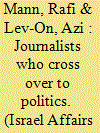

|
|
|
|
|
| Summary/Abstract |
The crossover of journalists to politics is not a novel phenomenon, but in Israel it has intensified in recent years with the increase in the number and the name recognition of the journalists who make the transition. Why do journalists make the transition to politics? Do they make an effective use of their media skills, and how do they perform as parliamentarians? To address these questions, semi-structured interviews were conducted with parliamentary reporters ‒ the main link between parliamentary affairs and the media.
|
|
|
|
|
|
|
|
|
|
|
|
|
|
|
|
| 8 |
ID:
190048
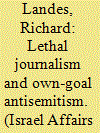

|
|
|
|
|
| Summary/Abstract |
This article examines the close relationship between the consistent practice of lethal journalism (in this case reporting Palestinian war propaganda as news) among Western journalists, and the sudden appearance of the ‘new antisemitism’ at the turn of the last millennium. It looks closely at two cases – the al-Durah ‘murder’ (September 2000) and the Jenin ‘massacre’ (April 2002), and the manner in which this allegedly professional journalism opened the door to a host of postmodern antisemitic themes, from Holocaust inversion to progressive supersessionist projections, and the manner in which Jihadists bent on destroying the West have used through this unacknowledged hostility to Jews – it’s merely criticism of Israel – as the West’s soft underbelly.
|
|
|
|
|
|
|
|
|
|
|
|
|
|
|
|
| 9 |
ID:
182898


|
|
|
|
|
| Summary/Abstract |
The establishment of the State of Israel symbolised the beginning of a new era in the relationship between Muslims and Jews and sparked a religious conflict that has continued to date. This article examines the main precepts underlying the rejection of the idea of Jewish statehood/nationhood by the Muslim Brotherhood, perhaps the largest and most influential Islamist movement in the post-World War I era.
|
|
|
|
|
|
|
|
|
|
|
|
|
|
|
|
| 10 |
ID:
141962
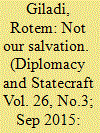

|
|
|
|
|
| Summary/Abstract |
Jewish individuals and organisations played a cardinal role in making and promoting the 1948 Genocide Convention. The early attitude of the Jewish state—established a few months before the Convention’s conclusion—has not hitherto been explored. This analysis reconstructs Israel’s involvement in the 1951 advisory proceedings at the International Court of Justice concerning the Convention. Based on Ministry of Foreign Affairs archives and Court records, it demonstrates that contrary to what scholarship on subsequent episodes assumes or implies, Israel had no particular attachment to, nor was it vested in, the Convention. Rather, its attitude ranged from indifference and disinterest to scepticism and hostility. It allowed Israeli diplomats to utilise the Convention as a means to affect other neither urgent nor imperative foreign policy ends.
|
|
|
|
|
|
|
|
|
|
|
|
|
|
|
|
| 11 |
ID:
167152
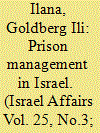

|
|
|
|
|
| Summary/Abstract |
A prison is a unique institution since its environment is founded on a discourse of power between the prison staff, using force under the authority given to them by the state, and the inmate group, using counter-power. This article discusses the unique warden’s role and prison management in Israel with an emphasis on the adoption of rehabilitation approach and defining recidivism prevention as a social target. Such a policy can retain human dignity and human rights in prison, save money and bring significant social benefits to society.
|
|
|
|
|
|
|
|
|
|
|
|
|
|
|
|
| 12 |
ID:
160290
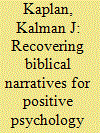

|
|
|
|
|
| Summary/Abstract |
Suicide is the ultimate outcome of a tragic and pessimistic view of life, so prevalent in ancient Greek writings. Indeed, over 16 suicides and self-mutilations can be found in the 26 surviving tragedies of Sophocles and Euripides. In contrast, only six suicides can be found in the Hebrew Scriptures. This article examines evidence regarding seven risk factors for suicide. It contrasts biblical and Greek narratives regarding each of these factors respectively: (1) Elijah against Ajax; (2) Job against Zeno; (3) David against Coriolanus; (4) Jonah against Narcissus; (5) Moses against Oedipus; (6) Rebecca against Phaedra; and finally (7) Ruth against Antigone. All these Greek narratives lead to self-destructive behaviours while biblical narratives provide a hopeful positive psychology, and a safe way out these dilemmas. It is high time to develop a biblical psychology and psychotherapy commensurate with the restored land of Israel and a Hebrew civilisation.
|
|
|
|
|
|
|
|
|
|
|
|
|
|
|
|
| 13 |
ID:
161384
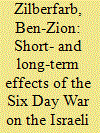

|
|
|
|
|
| Summary/Abstract |
This article examines the short- and long-term effects of the 1967 Six Day War on the Israeli economy. In the short run, the war led to a very big increase in aggregate demand (mainly military expenditures). This got the economy out of a Keynesian recession that prevailed before the war. There were several long-term effects. The French embargo on arms shipments to Israel, following the war, induced the development of a large military industrial base, which later became the basis for the impressive development of the high-tech industry. The influx of Palestinian workers into Israel depressed wages of unskilled workers, which slowed down the shift to more efficient production techniques (especially in construction). It also increased the dependency of the Palestinian economy on income earned by Palestinian workers in Israel.
|
|
|
|
|
|
|
|
|
|
|
|
|
|
|
|
| 14 |
ID:
178942


|
|
|
|
|
| Summary/Abstract |
A multi-national sample was used to investigate mechanisms that were hypothesized to moderate the relationship between exposure to political violence and symptoms of posttraumatic stress (PTS). We hypothesized that a) the phase of the conflict and b) the status asymmetry of the conflicting parties would moderate the relationship between exposure and PTS symptoms. We used original data from four groups: Israelis and Palestinians (n = 2,572), and Protestants and Catholics in Northern Ireland (n = 343). Looking at these two conflicts, we found that the positive relationship between exposure to violence and posttraumatic stress symptoms ceases to exist in a post-conflict setting (F(1, 2053) = 4.95, p < .05, η2 = 0.002). Interestingly, we found that PTS symptoms were highest among minority group members in an ongoing conflict irrespective of exposure to political violence (F(1, 2053) = 120.74, p < .001,η2 = 0.06). We provide explanations for these findings and discuss their psychological implications for victimized groups and the wider geopolitics of intergroup conflict.
|
|
|
|
|
|
|
|
|
|
|
|
|
|
|
|
| 15 |
ID:
182900
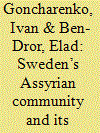

|
|
|
|
|
| Summary/Abstract |
This article examines attitudes within Sweden’s Assyrian community towards Israel, based on responses to a Swedish-language questionnaire distributed via the community’s electronic mailing list. The emergent picture is one of strong sympathy for the Jewish state, seen by respondents as a shining example of national self-determination based on the ingathering of the exiles – a dream nurtured by the world-dispersed small Assyrian nation. In addition, due to their deep animosity towards Turkey and the Arab states on account of their centuries-long persecution of the Assyrians, Swedish Assyrians tend to favour Israel in its feud with the Palestinians.
|
|
|
|
|
|
|
|
|
|
|
|
|
|
|
|
| 16 |
ID:
189420
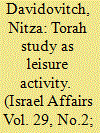

|
|
|
|
|
| Summary/Abstract |
This article discusses the contribution of Torah study as leisure activity to social support, hope and quality of life among Israeli adults. It shows that such study is associated positively with learners’ quality of life due to the acquisition of psychological resources that include social support by peers and hope. Shedding light on the world of people who study Torah as a leisure activity, the article also reveals that cultural sources that are part of an ancient tradition seem to contribute to one’s quality of life in the modern world as well.
|
|
|
|
|
|
|
|
|
|
|
|
|
|
|
|
| 17 |
ID:
160296


|
|
|
|
|
| Summary/Abstract |
This article presents findings from investigations of acclaimed gender employment changes in Israeli journalism, focusing on two main questions: Is the feminisation process of Israeli journalism continuing? Is it improving women’s employment and occupational status? Data were gathered from two international surveys that included Israel. The study found that while women are integrated in a variety of news areas, such as news presentation, and play a significant role in management, their roles and salaries are unequal to men. These findings shed light on gender (in)equality and identify some of the mechanisms that exclude Israeli women from the labour market.
|
|
|
|
|
|
|
|
|
|
|
|
|
|
|
|
|
|
|
|
|